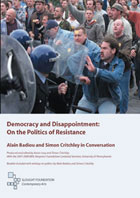
Democracy and Disappointment: On the Politics of Resistance Alain Badiou and Simon Critchley in Conversation 2007
Distributed by Microcinema International/Microcinema DVD, 1636 Bush St., Suite #2, SF, CA 94109; 415-447-9750
Produced by Aaron Levy and Simon Critchley
Director n/a
DVD, color, 105 min.
College
Philosophy, Political Theory
Date Entered: 09/03/2008
Reviewed by Malcolm L. Rigsby, Department of Sociology, Ouachita Baptist University, Arkadelphia, ARDemocracy and Disappointment: Alain Badiou/Simon Critchley on the Politics of Resistance is one video in the Conversations in Theory Series. In addition to the distributor, Microcinema International, this series is also accessible through the Slought Foundation. It is sponsored in part by the Slought Foundation, the Departments of Romance Languages, History and English, and the Program in Comparative Literature at the University of Pennsylvania.
The video portrays a specific conversation regarding the politics of resistance as staged between Alain Badiou and Simon Critchley that took place November 15, 2007 at the Slought Foundation in Philadelphia. Both Critchley (a British Philosopher) and Badiou (a French Moroccan Philosopher) are well written in academic philosophy and political theory. This presentation follows recent publications by each speaker; Infinitely Demanding: Ethics of Commitment, Politics of Resistance (Critchley 2007) and The Contemporary Figure of the Soldier in Politics and Poetry (Badiou 2007). http://www.lacan.com/badsold.htm
The video carefully portrays the views of both Badiou and Critchley, however due to several inadequacies the film is best reserved only to those who are well versed in philosophy and political science. Inadequacies of the film include:
- No introduction. The viewer is thrown directly into the dialog without any preface or formal introduction. It is as if the viewer walked into an already ongoing discussion. This hinders the listener in quickly grasping the material.
- Dry and mundane presentation; strictly lecture without any graphics such as PowerPoint or even a white-board. Neither Badiou nor Critchley present a charismatic portrayal of himself in this video. Critchley exhibits many distracting habits and movements that include removal of garments, handling a water glass, sniffing habitually, moving his hands and picking at his fingers. Badiou’s voice fails to carry well and it is clear that sound was not tested before speaking. In addition, his accent requires the listener to intensely attempt to try to understand him throughout the film. Sub-titles or sound adjustment for Badiou would have been most helpful in clarifying his message.
- No summary ending.
Regardless the inadequacies, this film offers valuable insight into the philosophies of both Critchley and Badiou and offers the viewer the ability to better understand their writings. The value of the film may be greatly improved and made more understandable to the first time viewer with a prologue or introduction and a concluding round-table. It is also advisable that the viewer be familiar with some of the latest writings by each speaker. Editing would greatly enhance the film and eliminate much of the distracting noises, and movements such as sniffing, walking from the podium to get water, removal of garments, etc.
Having been critical in the above discussion it is important to note that the basic theoretical and philosophical discussion, which explores justice in a world that exhibits so much violence and disorientation, is quite valuable. Perhaps most valuable is the opportunity to receive further insight into Critchley’s premise undertaken in Infinitely Demanding in which he proposes that political motivation in our current era may best find a modus in the form of ethical anarchism. In conclusion, the question we are left with is not whether humanity requires a new type of heroic figure, but rather what type of activist heroism will mesh with our current form of societal norm?